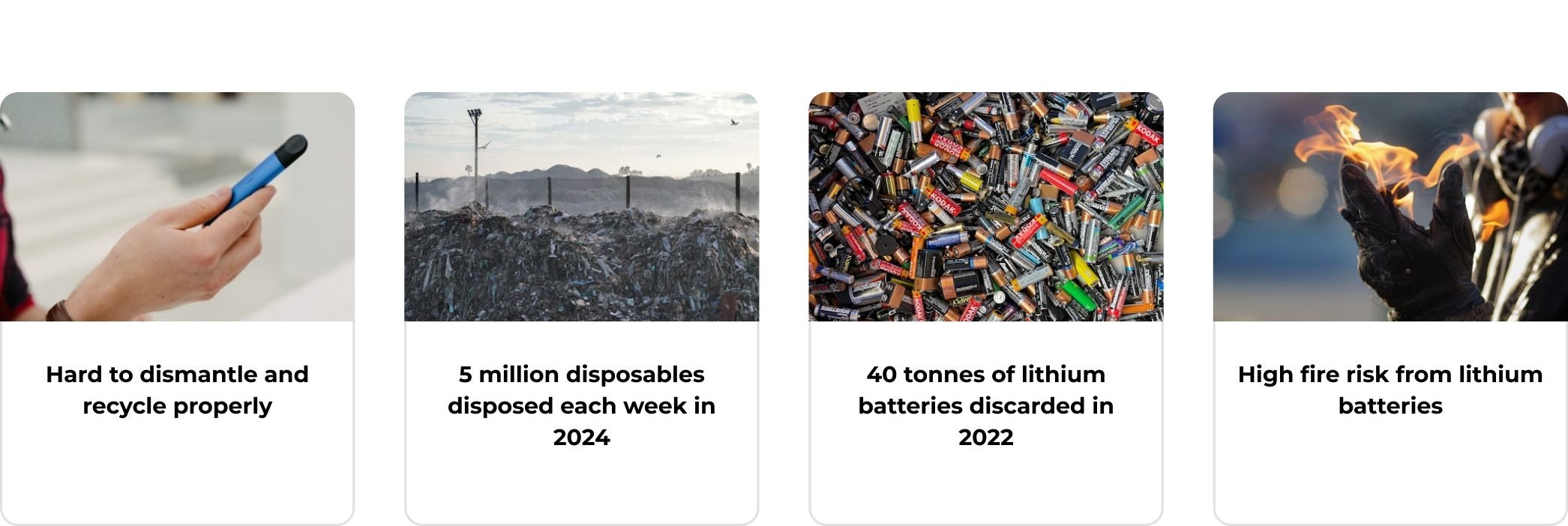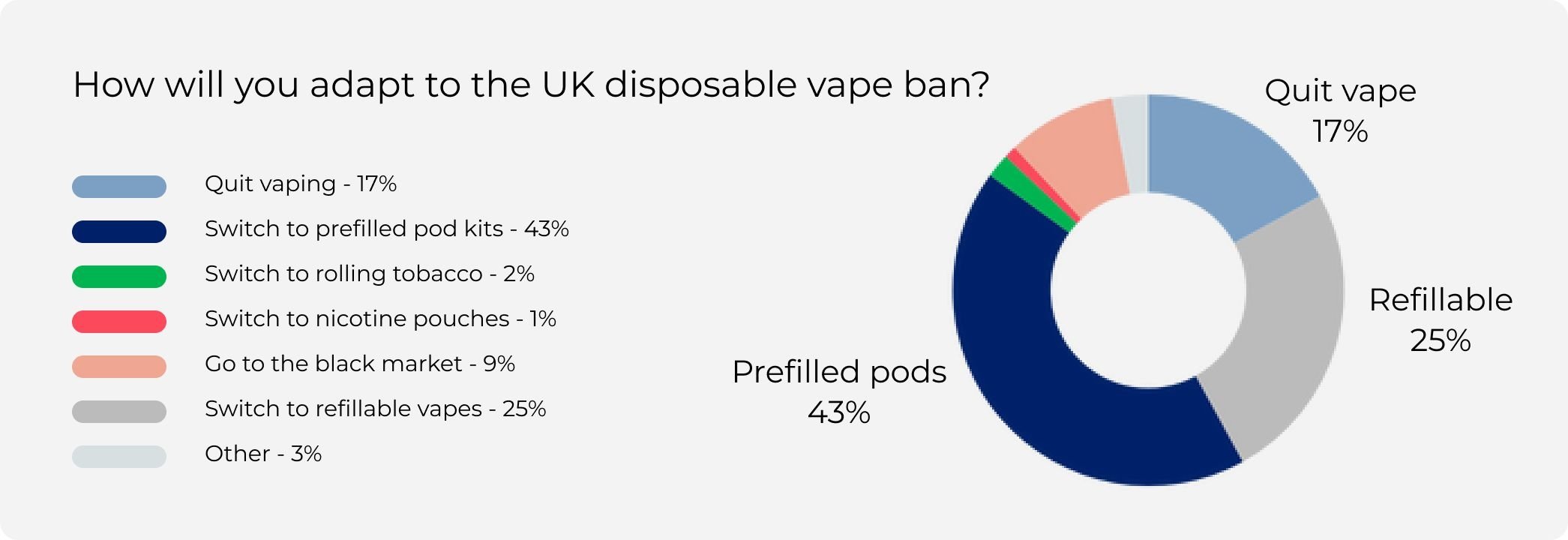Hi! Did you know that you can easily reorder a previous order on My Pages? Just click “reorder” to get all your favourites delivered again.
Published 2024-12-11
Last update 2025-07-14
UK’s Disposable Vape Ban Explained
Since 1 June 2025, disposable vapes have been banned in the UK. This article explains the reasons behind the ban, its impact, and the best alternatives to disposable vapes.

Key Takeaways
- Ban scope: The UK’s ban, in effect from 1 June 2025, targets only single-use disposable vapes, and certain rechargeable vapes that don’t support pod or coil replacement. However, vape pod kits and vape mods, which allow for pod or e-liquid refills, remain legal.
- Environmental concerns: Before the ban, nearly 5 million disposable vapes were discarded each week, driving up waste management and recycling costs and prompting environmental action.
- Youth vaping concerns: Disposable vapes contributed to a rise in underage vaping prior to the ban, with a high percentage of users under 24 years old.
- Alternatives: Rechargeable vape pod kits, vape mods, and nicotine pouches offer sustainable and customisable alternatives to disposables, which are no longer legal.
An Overview: Disposable Vapes in the UK What are Disposable Vapes? Why were Disposable Vapes Banned? When Were Disposable Vapes Banned in the UK? How the Vape Ban Will Affect UK Vapers How the Government Plans to Curb Illegal Disposable Vape Sales The Economic Impact of the UK Vaping Industry and the Disposable Vape Ban Making the Switch from Disposable Vapes Conclusion
An Overview: Disposable Vapes in the UK
As of July 2025, around 5.6 million adults - approximately 11% of the population - vaped in Great Britain. Of these, over 40% of UK vapers reported using single-use vapes. Considering these numbers, the UK's vaping landscape is expected to change in a major way following the June 2025 ban on disposable vapes.
The ban came in response to urgent environmental and waste concerns, with a 2023 study showing that nearly 5 million disposable vapes were being discarded weekly - up from 1.3 million the year before.
This staggering increase represented a growing burden on waste management, with recycling costs estimated at £200 million a year.
With the ban now in effect, many vapers are exploring new alternatives—and there’s no shortage of great options. This article explains the reasons behind the ban, its impact, and the best alternatives to disposable vapes.
What are Disposable Vapes?
Disposable vapes are single-use electronic devices prefilled with e-liquid, designed for ease of use and convenience: they require no charging, refilling, or maintenance. Once the e-liquid runs out, the device is disposed of.
Disposable vapes typically offer up to 600 puffs, come pre-charged, and are ready to use right out of the box - making them a popular choice for convenience.
Most disposable vapes feature a built-in battery, heating element, and e-liquid reservoir. These components work together to vaporise the liquid when you inhale, providing a hassle-free experience without buttons or settings.
Popular Disposable Vape Brands
Brands like Elf Bar and Lost Mary gained widespread popularity due to their disposable vapes having an easy-to-use design and a wide variety of flavours, plus they were affordable.
Elf Bar, for example, offered many disposable vape flavours, from fruity options like watermelon and blueberry to more traditional menthols. These brands were known for their compact, portable designs and they became the go-to choice for many UK vapers, particularly those new to vaping or seeking a low-commitment experience.
With their accessible design and variety, disposable vapes surged in popularity but concerns were also raised around waste. This led to the UK ban on single-use vape products that came into force in June 2025.
Why were Disposable Vapes Banned?

According to a recent study by Material Focus, nearly 5 million disposable vapes were either littered or discarded each week in 2024 - a fourfold increase from the previous year.
This surge in vape waste underscored the environmental impact that single-use devices were having, with disposables contributing significantly to landfill and electronic waste challenges across the UK.
Due to their design, these devices are notoriously difficult to dismantle and recycle properly.
In 2022 alone, over 40 tonnes of lithium batteries from disposable vapes were discarded - enough to power 5,000 electric vehicles, the government reports.
When improperly disposed of, lithium-ion batteries present a high fire risk, as punctures or damage can lead to spontaneous ignition. Moreover, disposable vapes contain circuit boards which, if left to degrade, may leach harmful substances like cobalt and copper into the environment.
Stuart Hayward-Higham, Technical Development Director at SUEZ Recycling and Recovery UK, cautions that "if a lithium battery is compromised in transit and pierced, it may spontaneously ignite like a firework."
Beyond environmental hazards, the government was also concerned about the accessibility of disposable vapes to minors, which had contributed to a rise in youth vaping.
Rise in Youth Vaping
Despite a legal ban on vape sales to those under 18, vaping among young teens has doubled. As of 2023, close to 8% of 11- to 17-year-olds in the UK reported vaping - up from 4% in 2020. Vaping has become twice as common as smoking among children, and there’s a marked increase in teens starting to vape despite having never smoked.
While the latest data from Action on Smoking and Health (ASH) reveals that vaping rates among 11- to 17-year-olds have stabilised with no significant change between 2023 and 2024, the numbers remain alarmingly high. Despite the pause in growth, these figures point to an ongoing issue that can’t be ignored.
This rise in youth vaping, combined with the ecological issues posed by disposable vapes, intensified pressure on the government to introduce a ban on single-use vape products.
Will Other Vapes Be Banned?
No, the UK ban is specific to single-use, disposable vapes and does not affect other types of vaping devices. Refillable products, such as vape mods, vape kits, and pod systems, remain permitted under UK law.
These refillable options offer a more sustainable alternative to disposables, as they generate less waste, can be reused with replaceable e-liquid cartridges or pods, and are often recyclable.
Vape mods and kits, for instance, are designed for long-term use with a range of settings that let users customise their experience, while pod systems offer a simpler, more portable option with refillable pods.
Are Vape Flavours Banned?
The UK ban on disposable vapes was introduced under the Environmental Act and does not restrict vape flavours. Any potential flavour regulations will be addressed separately under the Tobacco and Vaping Act, so it remains to be seen what changes might come from there.
As of today, flavoured e-liquids are still available for use in refillable and rechargeable devices, allowing users to enjoy a variety of options even after the disposable ban has come into effect.
However, there is ongoing debate. While a ban has not yet been proposed, any future restrictions would likely centre on flavour descriptors.
The city of San Francisco serves as a cautionary tale. A study from the Yale School of Public Health found that following the city’s 2018 flavour ban on vape and tobacco products, high school students in San Francisco were twice as likely to smoke conventional cigarettes compared to students in districts without such bans.
Meanwhile, surveys across the UK show strong opposition to a flavour ban among vapers. According to the UK Vaping Industry Association (UKVIA), 1 in 3 vapers fear that such a ban could push them back to cigarettes, and 84% say that flavoured options help them control their smoking habits.
Grassroots campaigns, such as Haypp’s “No Flavour Ban on Vapes” petition, have also gained traction as the Tobacco and Vapes Bill moves forward. Flavour choice appears to remain secure for those switching to reusable devices - at least for the foreseeable future.
When Were Disposable Vapes Banned in the UK?
The sale of disposable vapes was banned across the UK on 1 June 2025.
The legislation was part of the UK’s broader push toward a circular economy, which aims to extend product lifecycles, reduce waste, and minimise environmental impact.
When Was the Decision Made?
On 23 October 2024, Parliament passed legislation to ban the sale of disposable vapes starting 1 June 2025. On top of banning disposable, single-use vapes, the Tobacco and Vapes Bill also introduced a new tax on vape e-liquids.
The proposed duty structure introduces new tax rates on e-liquids, aiming to encourage users to consider alternative nicotine options.
The decision followed consultations with the public and input from environmental and health advocacy groups, highlighting the waste tied to disposable vapes.
"Single-use vapes are highly wasteful and tarnish our towns and cities. This ban is a crucial step in ending the country's throwaway culture"
By targeting single-use products, the government aimed to conserve environmental resources, promote public health, and reduce youth access to vaping products.
How the Vape Ban Will Affect UK Vapers
With close to half of UK vapers using disposables prior to 1 June 2025, the recent ban is expected to impact a large number of users–though its full effects remain to be seen.
Before the ban, we surveyed 369 vapers to find out how they planned to adapt once disposables were no longer available.
According to our survey:
- 43% of respondents planned to switch to prefilled pod vapes, making them the most popular alternative.
- 25% would opt for refillable vapes, while 7% planned to quit vaping altogether.
- A smaller percentage, 2%, said they would return to rolling tobacco, highlighting concerns that some users might revert to smoking.
- 9% admitted they would consider purchasing vapes from the black market, raising potential issues around unregulated products.
This shift suggests that pod-based vapes will play a significant role in the post-disposable market, offering a familiar and convenient experience for former disposable users.

Risk that Consumers Might Return to Smoking
UKVIA has voiced concerns that the ban could lead many to resume smoking. Their recent survey found that 14% of vapers would likely return to smoking if flavoured or disposable vapes were banned.
Our survey also revealed a similar sentiment.
While only 2% said they would switch to rolling tobacco, this remains a risk worth addressing. Previous research has shown that restrictions on flavoured vapes and disposable products can unintentionally push some users back to traditional cigarettes.
How the Government Plans to Curb Illegal Disposable Vape Sales
With concerns that the disposable vape ban may push some users toward the black market, the government is focusing on enforcement to prevent illegal sales.
With 34% of surveyed vapers stating they would consider purchasing illegal vapes and 90% believing the ban will increase black market activity, the risk of unregulated sales is a major concern.
Unregulated vapes may contain harmful chemicals like lead and nickel, often exceed legal nicotine levels, and can deliver as many as 7,000 puffs - far more than the 600 to 1,000 puffs allowed in regulated products.
To combat this, the UK government is stepping up penalties for retailers selling to minors, including on-the-spot fines and other sanctions. An additional £30 million per year will also be allocated to enforcement agencies to address illicit sales of tobacco and vaping products.
The Department of Health and Social Care points to prior successes in reducing illicit tobacco consumption through targeted measures, such as the 25% decrease in illegal cigarette use after raising the legal smoking age from 16 to 18.

The Economic Impact of the UK Vaping Industry and the Disposable Vape Ban
The recent ban on disposable vapes is expected to have substantial effects on the UK’s vape industry, especially for businesses reliant on high single-use vape sales. While refillable vapes and e-liquids will remain available, this shift may reshape demand and alter market dynamics as consumers explore alternatives.
The 2021 Cebr report for UKVIA highlights the economic footprint of the UK vaping industry. In 2021 alone, the industry contributed £1.3 billion in turnover.
This reflects an impressive 23.4% increase in turnover from 2017 to 2021.
Given the rapid growth of the disposable vape market, it’s likely that these figures have risen further in 2023 and 2024, highlighting the likely impact of the ban.
With £310 million generated in tax revenues in 2021, the industry’s role in the UK economy is undeniable. The disposable vape ban is thus expected to ripple through the economic landscape, potentially reshaping employment patterns, revenue streams, and overall market structure.
Making the Switch from Disposable Vapes

Now that the UK’s disposable vape ban is in effect, you might be wondering what options are available. Fortunately, there are several alternatives on the market that can provide the same variety of flavours and nicotine strengths, allowing you to customise your vaping experience - all without the waste of single-use products. From reusable devices to nicotine pouches, here are the top alternatives to consider:
Vape Kits and Pods
Vape kits, including pod systems, are ideal for users transitioning from disposables to refillable devices. These kits are typically compact, straightforward, and similar in size and experience to disposables, but with the added benefit of customisable flavours and nicotine levels.
Pods come in two main types: prefilled and refillable.
| Prefilled Pods | Refillable Pods |
| Prefilled pods are single-use and can be disposed of once the e-liquid inside is depleted, making them convenient for users who prefer a simpler setup. | Refillable pods, on the other hand, can be filled with your preferred e-liquids, giving you more flexibility in flavour and nicotine options. This versatility makes vape kits and pod systems an excellent choice for users seeking convenience with added customisation. |
Vape Mods
For more advanced users, vape mods provide a highly customisable vaping experience, with larger battery capacities and adjustable settings that allow you to fine-tune vapour production, flavour, and intensity. Vape mods often come with refillable pods or tanks that can be filled with your preferred e-liquid, giving you freedom over flavour choices and nicotine levels.
Additionally, vape mods let users control the PG/VG ratio of the e-liquid, adjusting the viscosity for smoother vapour or larger “clouds” as desired. Although mods may seem complex at first, they offer an unparalleled level of control, making them popular among experienced vapers looking for a tailored experience.
Nicotine Pouches
Nicotine pouches are another alternative, especially for those looking for a smoke-free and vapour-free experience. Available in a wide range of flavours and nicotine strengths, pouches are discreet, long-lasting, and convenient for users on the go.
Conclusion
The June 2025 UK disposable vape ban marks a significant shift aimed primarily at reducing waste.
While the impact on users will be substantial, this regulation opens doors to more sustainable, reusable vaping options that allow for customisation and flexibility.
However, policymakers should be mindful not to unintentionally steer minors toward cigarettes in their efforts to curb youth vaping.
By considering alternatives like rechargeable devices and nicotine pouches, vapers can gradually shift away from disposables, maintaining their routine while aligning with environmentally responsible choices.
For more expert insights on the future of vaping in the UK, check out our exclusive interview with Marian, Haypp’s vape expert.
Disposable Vape Ban FAQs
When did the disposable vape ban take effect?
The UK’s disposable vape ban took effect on 1 June 2025.
Why were only disposable vapes banned?
The ban focused on disposables due to their negative environmental impact.
Have flavours been banned along with disposable vapes?
No, vape flavours remain available in refillable and rechargeable devices. The ban applies only to single-use disposable vapes.
What are the best alternatives to disposable vapes?
Now that disposables are banned, vape pod kits, pod systems, vape mods, and nicotine pouches are all excellent alternatives, offering customisable nicotine levels and flavours.
Could the ban lead to increased illegal vape sales?
Possibly. According to our survey conducted before the ban, 90% of respondents believe the ban could lead to more illegal vape sales.
